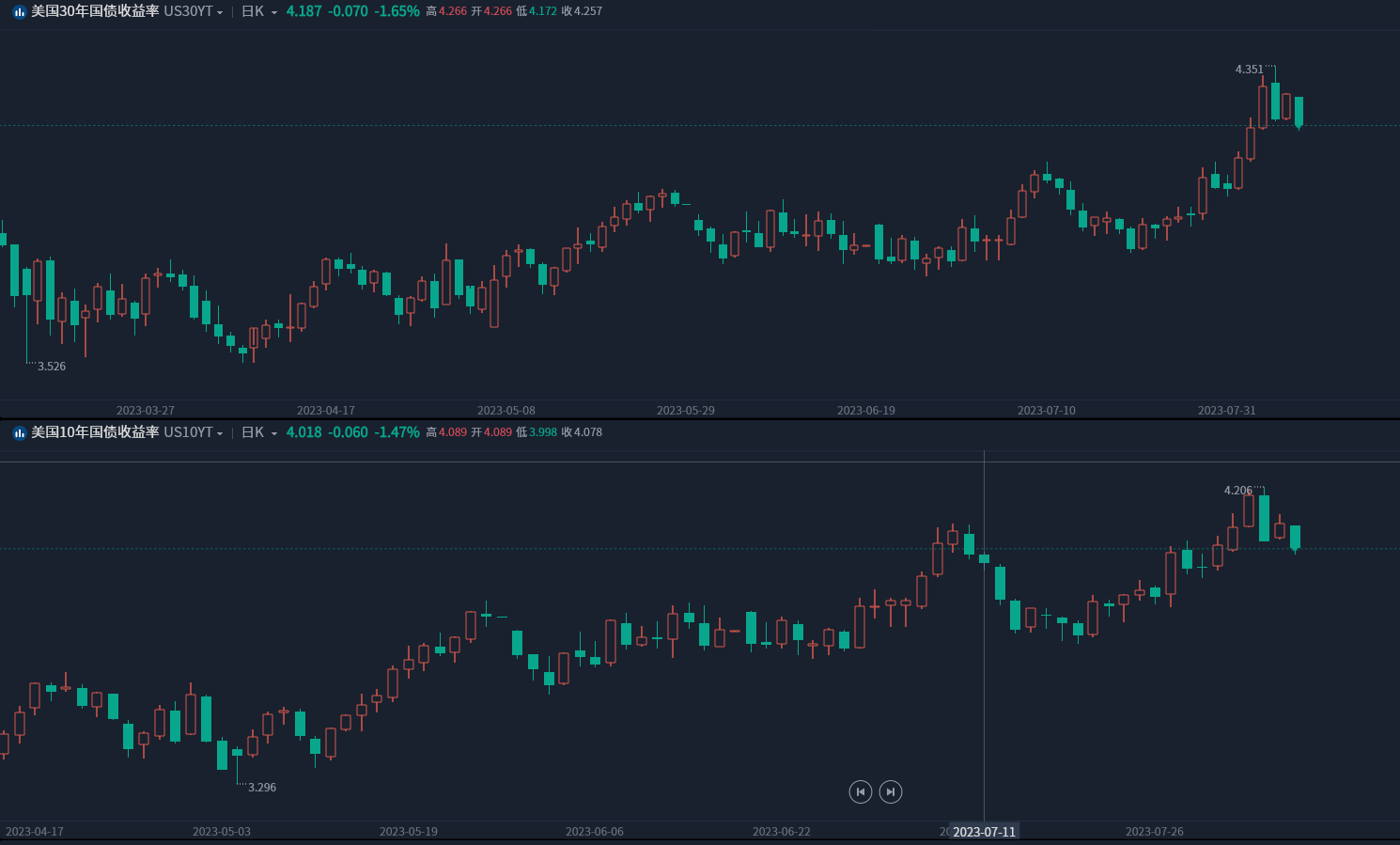Federal Government Faces Shutdown U.S. Debt Sells Fitch Really Bet on Treasure This Time?
Fitch's downgrade of the default rating of long-term U.S. foreign currency issuers is proving to be pulling the U.S. federal government back into the spotlight。
Fitch's downgrade of the default rating of long-term U.S. foreign currency issuers is proving to be pulling the U.S. federal government back into the spotlight。
US government at risk of shutdown again
Entering August, U.S. lawmakers have ushered in a recess。However, the previous budget process in the U.S. House of Representatives, which aims to fund the U.S. federal government, came to an abrupt end at the end of July due to a growing conflict over spending levels and social hotspots.。
It is understood that the government's new fiscal year will officially begin on October 1, and Congress must act to solve the government's funding problems before the start of the new fiscal year.。However, taking into account the recess factor, the vast majority of parliamentarians have now begun to suspend their work.。There are fears that the U.S. government will risk another shutdown if the issue is not resolved by the September 30 deadline.。
There are currently two solutions on the table: first, Congress passes a spending bill to fund government agencies until next year.。Second, simply taking interim measures to keep the institutions running until a longer-term agreement is reached。The source revealed that no matter which option is ultimately decided, the decision process will not be easy.。
As planned, members of the U.S. House of Representatives will return on September 12.。By then, they will face numerous to-dos, including passing 11 of the 12 annual appropriations bills and coordinating their differences with the Senate, needing to free up their hands to resolve the U.S. government's budget process.。

Encouraged by Fitch's downgrade of the U.S., the push for this budget process is now getting particularly tricky。It is understood that the Republican-controlled House of Representatives and the Democratic-controlled Senate are clearly divided at the level of government spending.。Now, many members of the House of Representatives are turning against the debt ceiling deal pushed by Democrats like President Joe Biden and refusing to vote for it.。
Republican conservatives have done everything possible to snipe the debt ceiling bill and get spending cuts。In their proposed bill, the U.S. federal government is allowed to spend a much smaller amount than the figure on the agreement.。On top of that, they added dozens of policy add-ons that were widely opposed by Democrats, including restrictions on access to abortion drugs, a ban on funding for hormone therapy and certain procedures for transgender veterans, and a ban on diversity training programs in the federal workplace.。
In response, Anna Wong, chief U.S. economist at Bloomberg Economics, warned that while the immediate economic impact of the U.S. government shutdown may be limited, it came at a "particularly anachronistic" time.。This is because the Fed will announce a key interest rate decision in September, and the increased likelihood of a prolonged shutdown in the U.S. government could affect the Fed's position。During the 2018-2019 U.S. government shutdown, the release of many key economic indicators was delayed。
Gennadiy Goldberg, a senior U.S. interest rate strategist at TD Securities, said: "A prolonged shutdown of the U.S. government could make it more difficult for the Fed, which is why I think the market may be nervous and the Fed may miss the turning point in the fall as a result.。"
U.S. bond yields climb, major banks call for bargain-hunting
Historically, the U.S. government shutdowns in 2018 and 1995 have stimulated demand for safe-haven assets, which may stimulate U.S. debt。
But since late July, yields on U.S. Treasuries have been climbing。Long-term U.S. bond yields are now sharply higher, with 10-year and 30-year Treasury yields about 20 basis points higher than they were a few weeks ago, close to the multi-year highs set last October - and the fact that U.S. bonds are suffering from a sell-off by holders due to the inverse relationship between bond prices and yields。

There are three reasons for the recent sell-off in U.S. debt.。
First, the U.S. Treasury's third-quarter financing plan, announced at the end of July, beat expectations, causing market concerns。Under the plan, the U.S. Treasury will borrow about $1 trillion in debt in the third quarter of 2023, nearly $300 billion more than previously announced plans to issue debt.。On top of that, the U.S. is expected to borrow about $852 billion more in debt in the fourth quarter, which will be another debt surge of nearly $100 billion.。In response, the U.S. Treasury Department said there are two main reasons for the huge debt issuance, the current low cash balance in the fiscal deposit account, and the expected low future revenue, but higher expenditure.。
Second, Fitch downgraded the U.S. 's long-term foreign currency issuer default rating to AA + from AAA, representing its concerns about the U.S. government's fiscal position over the next three years。Fitch said in a statement that the agency is concerned that the huge size of the U.S. federal government's debt will harm the interests of Treasury bondholders, while being disappointed with the U.S. government's repeated moves to break the debt ceiling and doubting its ability to solve its debt problems.。
Third, the Bank of Japan's language in adjusting its yield curve control policy also hit U.S. debt。
For the sell-off of U.S. debt, big Wall Street banks such as Goldman Sachs, Morgan Stanley and JPMorgan Chase believe that the sell-off is somewhat excessive and can now consider buying appropriately。Among other things, Goldman Sachs and Morgan Stanley recommend that clients buy 30-year U.S. bonds, while JPMorgan is bullish on 5-year Treasuries
Praveen Korapaty, a fixed income strategist at Goldman Sachs, believes that the market's recent sell-off of U.S. debt is somewhat untenable, saying that the recent sell-off in U.S. Treasuries looks like a combination of many factors, but we don't think any of the reasons are particularly convincing.。
Plavin noted that yields on U.S. Treasuries have risen after the recent Fed rate hike, so have Japanese investors started selling U.S. Treasuries in large quantities??The reason is that last week's rise in U.S. Treasury yields occurred mainly during the U.S. trading session, rather than the Asia-Pacific trading session, when Japanese investors were most active, suggesting that the narrowing of the U.S.-Japan interest rate differential had little impact on the U.S. bond market.。
He also stressed that Fitch's credit rating downgrade is really important?It's not that important。The bipartisan dispute over the debt ceiling mentioned by Fitch is well known, and Fitch's downgrade is nothing new。
·Original
Disclaimer: The views in this article are from the original Creator and do not represent the views or position of Hawk Insight. The content of the article is for reference, communication and learning only, and does not constitute investment advice. If it involves copyright issues, please contact us for deletion.